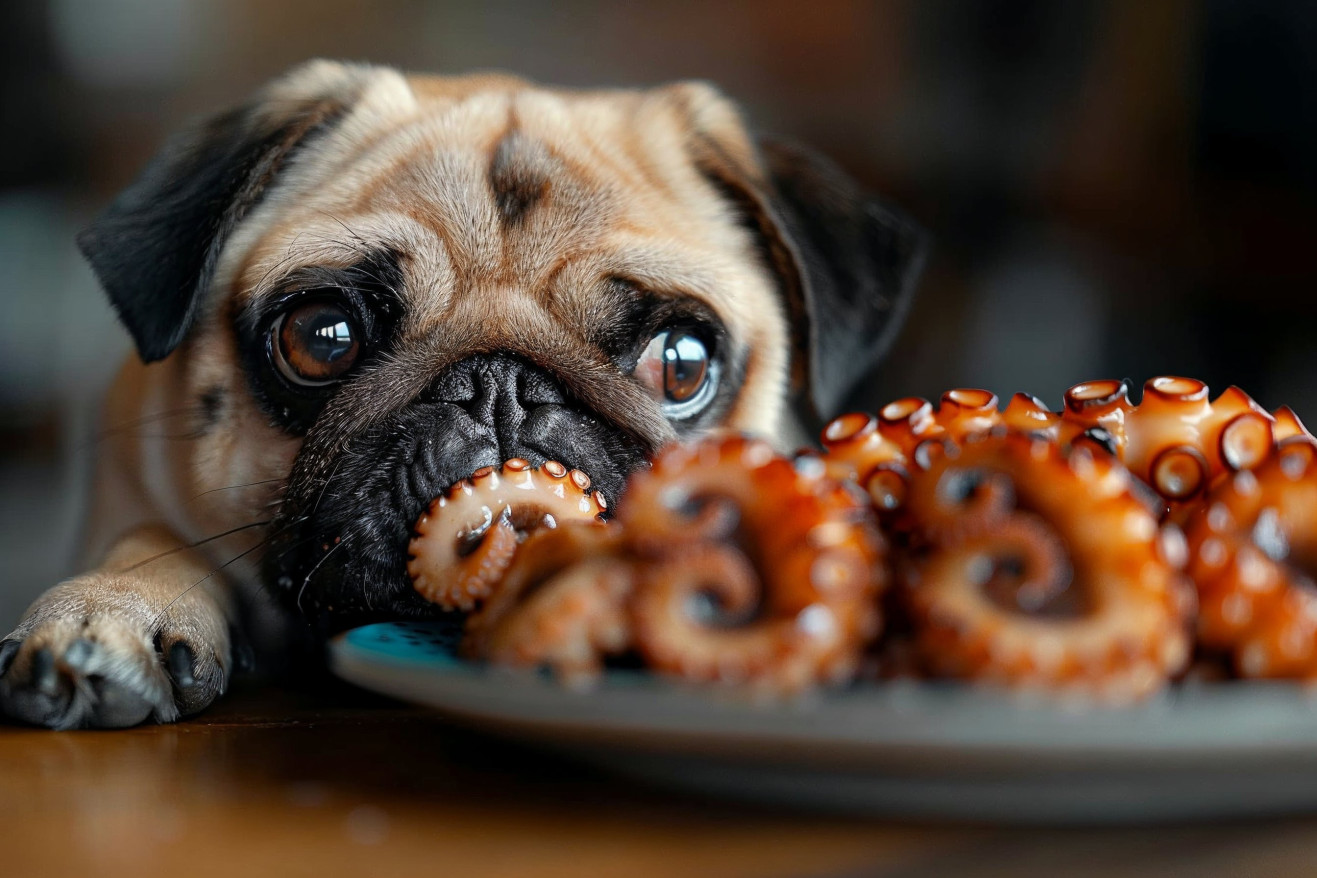Can Dogs Eat Octopus? Exploring the Safety and Nutrition
30 March 2024 • Updated 29 March 2024

This often leads pet parents to ask questions about how easy it is for dogs to digest these foods, as well as what kind of nutritional value and potential harm they may pose. While cooked octopus can be fed to dogs in small amounts, it's not the easiest food for them to digest and it's high in cholesterol. This means that while it can be a good source of protein, omega-3 fatty acids, and antioxidants, it should be fed to dogs in moderation and isn't the best choice for a regular part of their diet.
To help you learn more about the potential benefits and risks of feeding octopus to your dog, this article reviews the latest scientific evidence from the fields of veterinary medicine, animal nutrition, and marine biology. By taking a multidiscjsonary approach, this article will help you learn about the nutritional content of octopus meat, its impact on a dog's health, and the best ways to feed it to your pet, so you can decide whether or not it's the right choice for your dog.
Can dogs eat octopus?
Risks of Feeding Dogs Raw Octopus
There are many health risks associated with feeding dogs raw octopus, mainly due to the potential for bacteria and other contaminants. In a study cited by WestieVibes, researchers discovered that 78% of octopus samples contained high levels of the potentially deadly bacteria Aeromonas hydrophila and 26% contained Proteus vulgaris, which is a common cause of urinary tract infections.
Both of these bacteria can make dogs very sick if they eat raw octopus. In addition, octopus can contain heavy metals like lead, according to the same WestieVibes article, which can lead to a variety of health problems. The Dog Forum notes that while cooked octopus can be healthy, raw octopus should be avoided at all costs because of the potential for deadly bacteria like Aeromonas hydrophila.
As pointed out by Shili Imed on Medium, raw octopus also poses a risk of parasites that can make dogs very sick, as well as the potential for poisoning from substances like tetrodotoxin. To prevent these risks, it’s important to only feed dogs fully cooked octopus to ensure that bacteria and other contaminants that could make them sick are eliminated.
Nutritional Benefits of Octopus for Dogs
Octopus is a good source of lean protein and essential amino acids, so it can be a healthy addition to your dog's diet if it's cooked and fed to them in moderation. Healthline explains that octopus is low in fat and calories, but it's high in important vitamins and minerals, such as vitamin B12, selenium, copper, and iron.
The omega-3 fatty acids in octopus can help support your dog's heart, digestive, and immune health. Pet Dog Planet points out that octopus is full of important vitamins and minerals that can help improve your dog's health in a number of ways, including promoting good digestion, helping produce red blood cells, and supporting muscle and energy levels.
If it's cooked and fed to your dog in the right way, octopus can be a healthy addition to their diet, offering them lean protein and a variety of important nutrients.
How Much and How Often Should You Feed Your Dog Octopus?
As per Kate's K9 Pet Care, octopus should be given to dogs in moderation, as an occasional treat or supplement to their regular diet. The article notes that the right portion sizes will vary based on the dog's weight and size, but they should never make up more than 10% of the dog's daily calories.
Animal Wised says that for most dogs, octopus can be given once or twice a week in small amounts. The article stresses that octopus should be introduced slowly and that dogs should be watched for signs of an allergic reaction or other issues.
As mentioned by Pet Friendly House, while octopus can be a great source of protein and other nutrients if it's prepared properly, it's also a highly exotic food for dogs. Dogs that are not used to eating octopus can experience digestive issues if they eat more than a small amount. The article suggests that octopus should be given to dogs in moderation, once or twice a week.
How to Make Octopus Safe for Dogs to Eat
If you want to feed your dog octopus, it’s important to make sure the octopus is fully cooked to kill any bacteria or parasites that could make your dog sick. As explained by Joyful Thiek on Medium, raw octopus can contain bacteria such as Aeromonas hydrophila and parasites that can lead to serious health issues in dogs. To make sure you avoid these problems, the article says to make sure the octopus is cooked through before you give it to your dog.
In addition, you should stay away from dried or canned octopus treats because they can be high in salt, preservatives, and other additives that can be bad for dogs, according to the Healthy Dog Treats AU website. Instead, Dog Spotlight recommends giving your dog grilled or boiled octopus that hasn’t been seasoned, sauced, or oiled.
If you want to add octopus to your dog’s diet, you should introduce it slowly and in small amounts and watch for any signs of digestive upset or an allergic reaction. As with any new food, it’s a good idea to talk to your vet before you start feeding octopus to your dog on a regular basis.
Octopus Can Be an Occasional Treat for Dogs
The studies show that octopus can be safe for dogs to eat, but there are some important things to keep in mind. According to Can Dogs Eat Octopus? | Benefits, Risks, octopus is low in saturated fat and high in protein, omega-3, and omega-6 fatty acids, which can help support a dog's heart health. It also contains vitamins A, B3, B9, and B12, which can help support nerve and blood health.
However, the same source explains that octopus can contain heavy metals like lead, so it's important to make sure it's cooked thoroughly to reduce these levels. MasterClass also points out that while cooked octopus meat is generally safe to eat in moderation, there are some potential downsides, including the fact that the tentacles can pose a choking hazard and that dogs can be allergic to it.
Pet Dog Planet offers a detailed look at the benefits of feeding dogs octopus, including its high protein content, vitamins, minerals, and omega fatty acids, which can help support heart health, digestion, and overall health. However, they also warn that octopus should only be fed to dogs if it's cooked and doesn't have any seasonings or sauces on it.
Concluding Insights: Navigating the Safety and Nutrition of Dogs and Octopus
Cooked, unseasoned octopus can be a safe and nutritious occasional treat for dogs when fed in moderation. It provides valuable nutrients like protein, omega-3s, vitamins, and minerals that can benefit a dog's overall health.
That said, octopus should not be a regular part of a dog's diet because of its chewy texture, high cholesterol content, and potential dangers if not prepared properly. Pet parents should talk to a vet before giving octopus or any other new food to their dog.


